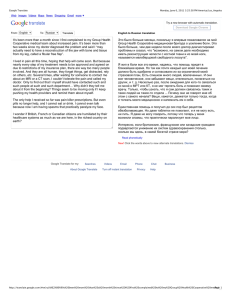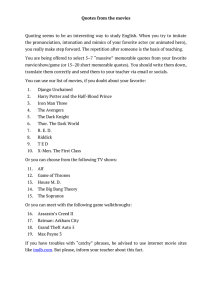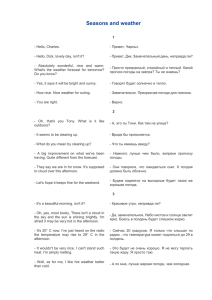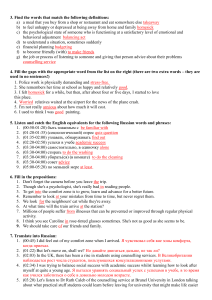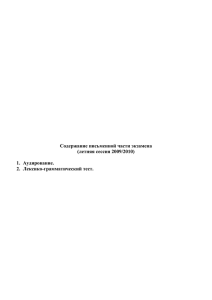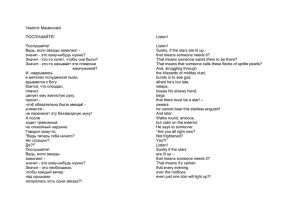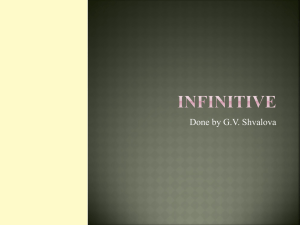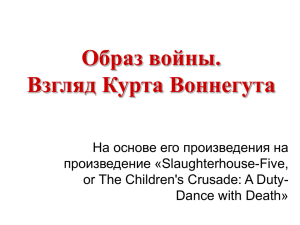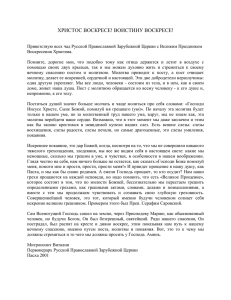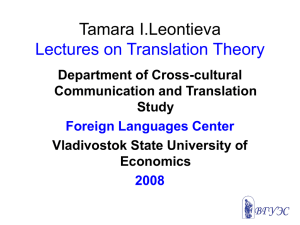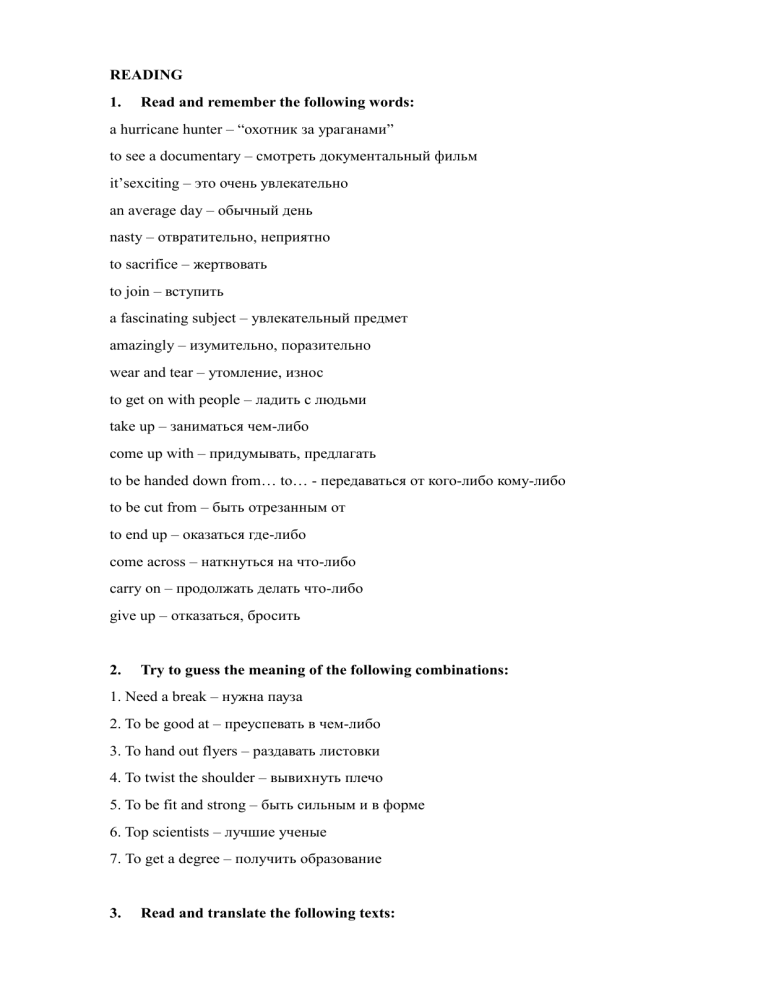
READING 1. Read and remember the following words: a hurricane hunter – “охотник за ураганами” to see a documentary – смотреть документальный фильм it’sexciting – это очень увлекательно an average day – обычный день nasty – отвратительно, неприятно to sacrifice – жертвовать to join – вступить a fascinating subject – увлекательный предмет amazingly – изумительно, поразительно wear and tear – утомление, износ to get on with people – ладить с людьми take up – заниматься чем-либо come up with – придумывать, предлагать to be handed down from… to… - передаваться от кого-либо кому-либо to be cut from – быть отрезанным от to end up – оказаться где-либо come across – наткнуться на что-либо carry on – продолжать делать что-либо give up – отказаться, бросить 2. Try to guess the meaning of the following combinations: 1. Need a break – нужна пауза 2. To be good at – преуспевать в чем-либо 3. To hand out flyers – раздавать листовки 4. To twist the shoulder – вывихнуть плечо 5. To be fit and strong – быть сильным и в форме 6. Top scientists – лучшие ученые 7. To get a degree – получить образование 3. Read and translate the following texts: The hurricane hunter Stanley Karras works as a meteorologist in Tampa, Florida. It’s his job to follow hurricanes by plane and provide information about them to scientists. Стэнли Карра работает метеорологом в Тампа, Флорида. В его работу входит следить за ураганами на самолете и предоставлять информацию у них ученым. How did you get the job? I was working for the National Meteorological Office in Bracknell, near London in the autumn of 1995, and I saw a documentary with my family called Stormchasers. It was about hurricane hunters and I thought, 'Wow, that's an interesting job!’ As it happened, two months later I came across an ad for a meteorologist to work in Florida with the same people who had made the documentary. I applied, was interviewed over the phone, moved to the US and started work here in Tampa in May 1996. Как вы получили эту работу? Я работал в Национальном Метеорологическом Оффисе в Бреккнелле, рядом с Лондоном, осенью 1995, и тогда с семьей я посмотрел документальный фильм, который назывался “Преследователи урагана”. Он был об охотниках за ураганами, и я подумал: “ Вау, это интересная работа!”. Два месяца спустя я проходил мимо рекламы о работе метеорологом во Флориде с людьми, снимавшими тот документальный фильм. Я подал заявку, прошел интервью по телефону, переехал в Соединенные Штаты и начал работать в Тампа в мае 1996г. What do you like most about it? I love the travel. I’ve been all over the world chasing hurricanes. It's exciting to end up in different cities and different countries day after day. If you’re a meteorologist, you have to love flying. I also love working with top scientists. I’ve learned so much from them. For me, it's like a classroom in the sky. Что вам нравится больше всего? Мне нравится путешествовать. Преследуя ураганы, я побывал почти по всему миру. Увлекательно оказыватьсяв разных городах, разных странах день за днем. Если вы метеоролог, вам придется полюбить летать. Также я люблю работать с лучшими учеными. От них я узнал очень многое. Для меня это как класс в небе. What’s an average day like? There’s no such thing as an average day in my job! It all depends on the weather, and you can’t control that. We often take off at a moment’s notice to chase storms. I’m the one who decides whether we fly low through a storm. I don’t want to take us into a hurricane that could be particularly nasty. Как проходит ваш обычный день? В моей работе нет таких вещей, которые бывают обычно! Все зависит от погоды, и вы не можете это контролировать. Часто мы можем собраться в любой момент, чтобы полететь за штормом. Я решаю, полетим мы низко через шторм или нет. Я не хочу вести нас в ураган, это было бы просто ужасно. Have you made any sacrifices to do this job? Yes, one big one. I’m away from my family. They all live in the UK. My wife's with me, of course, but her family is also in the UK, so we're pretty cut off from all of them. Вы пожертвовали чем-нибудь ради этой работы? Да, многим. Я далеко от своей семьи. Они живут в Соединенном Королевстве. Со мной, конечно, моя жена, но ее семья тоже в Соединонном Королевстве, поэтому мы буквально отрезаны от них. What would you like to do next? I'd like to join a space programme and be the first meteorologist in space, but I haven’t come up with an experiment to do in space yet. There aren’t any hurricanes! Что бы вы хотели делать дальше? Я бы хотел присоединиться к космической программе и быть первым метеорологом в космосе, но я еще не придумал эксперимент , который можно было бы провести в космосе. Там нет никаких ураганов! What advice would you give to someone who wanted to do your job? Study math and science and get a degree in meteorology. I’ve taken the hurricane hunter path, but you could be a weather forecaster or do research. It's a fascinating subject and the pay’s pretty good. Какой совет вы бы дали тем, кто хочет заниматься вашей работой? Учить математику и науку, а также получить образование в области метеорологии. Я выбрал путь охотника за ураганами, но вы бы могли быть синоптиком или проводить исследования. Это увлекательный предмет с хорошей оплатой. The trapeze artist - Акробат “You only live once so why stay in a boring job?” Linda Spelman was a lawyer who found a new career in a circus. She now works as a trapeze artist, travelling with circuses throughout Canada, Europe, and East Asia. “Вы живете единожды, так зачем же иметь скучную работу?” Линда Спелман была юристом, который начал новую карьеру в цирке. Сейчас она работает акробатом, гастролируя с цирком по Канаде, Европе и Восточной Азии. How did you get the job? That's quite a long story. My father's a lawyer, so I thought I’d become one, too. Studying law was really, really hard work, so I took up gymnastics in the evenings to help me relax. When I finally passed my exams, I thought, I need a break. I want to travel and learn a language. I’d heard of the EicoleNationale du Cirque in Montreal, so I thought, “'I’ll join the circus”. I went to Canada and did a trapeze course and amazingly, I was good at it. Как вы получили эту работу? Это долгая история. Мой отец – юрист, поэтому я тоже подумала им стать. Изучение закона было очень, очень сложным делом, поэтому по вечерам я занималась гимнастикой, чтобы расслабиться. Наконец сдав экзамены, я подумала, что мне нужна пауза. Я хочу путешествовать и учить язык. Я услышала о EicoleNationale Цирке, поэтому я подумала: “Я присоединюсь к цирку”. Я отправилась в Канаду, прошла курсы акробатики и, удивительно, я была хороша в этом. What do you like most about it? The excitement and the travel. I always wanted to travel and learn languages and I've done all of that. Also, I get on really well with circus people. They’re all nationalities. I’ve learned so much about life from them. Что вам больше всего нравится? Восторг и путешествия. Я всегда хотела путешествовать и изучать языки, и я сделала все из этого. Также я хорошо лажу с циркачами. Она разных национальностей. Я узнала от них так много о жизни. What’s an average day like? Everyone has to help in the circus, so you begin the day in a new town handing out flyers. In the afternoon, you work in the box office and rehearse. Then you do the act in the evening. At the end of a week, I’m so tired I spend a day in bed. Last month I twisted my shoulder and couldn’t work for a week. Как выглядит ваш обычный день? В цирке все должны помогать, поэтому день в новом городе начинается с того, что ты раздаешь листовки. Днем вы работаете на кассе и репетируете. Вечером вы выступаете. К концу недели я так устаю, что провожу весь день в кровати. В прошлом месяце я вывихнула плечо и не могла работать неделю. Have you made any sacrifices to do this job? No, I haven’t, not really. I gave up doing something that I hated and I’m doing something that I love. I do miss my family sometimes, but that’s all. And of course I earn a lot less than a lawyer. Вы пожертвовали чем-нибудь ради этой работы? На самом деле, нет. Я бросила то, что ненавидела, и занимаюсь тем, что я люблю. Иногда я скучаю по своей семье, но на этом все. И, конечно, я зарабатываю намного меньше, чем юрист. What would you like to do next? I’m 34 now. I’d like to carry on doing this until I’m at least 50. There are Russian trapeze artists still going strong in their fifties. Что бы вы хотели делать дальше? Сейчас мне 34. Я бы хотела продолжить заниматься этим минимум до 50. Есть русские акробаты, которые в свои 50 находятся в хорошей форме. What advice would you give to someone who wanted to do your job? You need to be fit and strong and have a good head for heights. But generally, I’d say to anyone with a dream, “Go for it! You only live once, so whystay in a boring job?” Что бы вы посоветовали тем, кто хочет заниматься тем же? Для высоты вам нужно быть сильным, иметь хорошие форму и здоровье. Но обычно тем, кто мечтает, я говорю: “Идите за мечтой! Вы живете раз, зачем оставаться на скучной работе?”. The cowboy in the sky – ковбой в небе Michael Doyle is an ironworker in New York City. He’s one of 100 or so ironworkers currently erecting the steel frame of a new 40-storey building in Times Square. These ironworkers are known as “cowboys in the sky”. Майкл Дойль – монтажник в Нью Йорке. Он один из примерно 100 монтажников, которые в настоящее время возводят стальной каркас нового 40-этажного здания на Таймс-сквер. Эти монтажники известны как «ковбои в небе». How did you get the job? Ironwork is a trade that is still handed down from father to son. Many of today’s ironworkers are descendants of the men who built New York’s first skyscrapers. My great-grandfather came over from Ireland in 1930 to work on the construction of the Empire State Building. My father and grandfather were also ironworkers. Как вы попали на эту работу? Монтажник – это профессия, которая до сих пор передается от отца к сыну. Многие из сегодняшних монтажников – потом людей, строивших первые небоскребы Нбю-Йорка. Мой прадед приехал из Ирландии в 1930, чтобы работать на строительстве Эмпайер Стэйт Билдинг. Мой отец и дед также были монтажниками. What do you like most about it? To me, ironworkers are the kings of construction. We make the skeleton that the other workers build on. We have real pride in our work - you look at the New York skyline and think “I helped build that”. Also, we work hard, we play hard. We get on well together. We ironworkers depend on each other for our lives. Oh, and the pay is good! Что вам нравится больше всего? Для меня монтажники – короли строительства. Мы создаем скелет, на котором строят другие. Мы по-настоящему гордимся своей работой - вы смотрите на горизонт Нью-Йорка и думаете: “Я помогал строить это”. Кроме того, мы усердно работаем. Мы хорошо ладим друг с другом. Мы доверяем друг другу наши жизни. О, и зарплата хорошая! What’s an average day like? You never stop in this job. Eight hours a day, from seven in the morning until three in the afternoon. You’re moving all the time. The crane lifts the iron girders and you have to move them into place. There’s always danger. It’s a fact of life for us. Как проходит ваш обычный день? В этой работе вы никогда не останавливаетесь. С 7 часов утра до трех дня. Вы всегда двигаетесь. Кран поднимает железные балки, и вы должны передвинуть их на место. Всегда есть опасность. Для нас это факт жизни. Have you made any sacrifices to do this job? Yes, one big one - physical health. The wear and tear to the body is enormous. I‘ve fallen three times. My father fell two storeys, lost a finger and broke his ankles. Вы пожертвовали чем-нибудь ради работы? Да, многим – физическим здоровьем. Тело очень страдает. Я падал три раза. Мой отец упал со второго этажа, потерял палец и сломал голеностоп. What would you like to do next? I’d like to work on something really important like my great-grandfather did. Or like my father did, who helped build the World Trade Center. It’s weird - he helped build it and I helped take it away. Что вы хотите делать дальше? Я бы хотел поработать над чем-то очень важным, как мой прадедушка. Или как мой отец, который помогал в строительстве Мирового Торгового Центра. Это странно – он помог построить его, а я снести. What advice would you give to someone who wanted to do your job? You need to be strong, really strong. You have to be OK with height. It usually takes about a year to get used to it. You can’t work and hold on with one hand all the time. Many guys try it once, then back off and say: “This is not for me”. Что бы вы посоветовали тем, кто хочет заниматься тем же? Вам нужно быть сильным, очень сильным. Вы должны не бояться высоты. Обычно нужен год, чтобы привыкнуть к этому. Вы не можете работать и держаться одной рукой все время. Многие парни пробовали, затем отказывались и говорили: «Это не для меня» 4. Answer the questions. 1.Where did Stanley Karras work? He is a meteorologist in Tampa, Florida. 2.Why did he choose the work of hurricane hunter? He watched a documentary about it. 3. Where did he move to? He moved to the US. 4. Why did he like travelling? It's exciting to end up in different cities and different countries day after day. 5. How can you describe his working day? «It all depends on the weather, and you can’t control that. We often take off at a moment’s notice to chase storms.» 6. What sacrifices has he made? He is away from his family. 7. What were his plans for future? He’d like to join a space programme. 8. What piece of advice does he give people for performing the job? To study math, science and get a degree in meteorology. 9. What was Linda Spelman studying? She was studying law. 10. Why did she decide to join the circus? She needed a break after passing the exams, so she joined the circus. 11. What did she like doing there? She liked travelling and learning languages. 12. Did she get on well with people? Yes, she did. 13. How did her day begin? It began with handing out flyers. 14. What sacrifices has Linda made? She misses her family sometimes. 15. What would she like to do in the future? She would like to work in circus until she is 50. 16. What piece of advice does she give people? You need to be fit and strong and have a good head for heights. 17. What did Michael erect in New York? He erects the steel frame of a new 40-storey building in Times Square. 18. How did he begin to work as an ironworker? Ironwork is a trade that is still handed down from father to son. 19. Why are ironworkersin great demand? Because they make the skeleton that the other workers build on. 20. Why is this work considered to be very hard? Because this job is dangerous. 21. What is Michael’s workingday like? You never stop in this job. Eight hours a day, from seven in the morning until three in the afternoon. You’re moving all the time. The crane lifts the iron girders and you have to move them into place. There’s always danger. 22. What sacrifices has Michael made? His physical health. 23. What plans did he have for? He’d like to work on something really important like his greatgrandfather did. 24. What piece of advice does he give people? You need to be strong, really strong. You have to be OK with height. 5. React to the statements. 1.Stanley works as a teacher. - He is a meteorologist. 2.Stanley found his job in his native town. - He found his job in other country. 3.He moved to the USA and began to work in April. – He began to work in May. 4.Stanley likes to visit different countries. True 5.He is afraid of flying. – He says, you need to get used to flying to be a meteorologist. 6.Stanley is always far from his family. True 7.He wants to take part in a space programme. True 8.Linda is a lawyer. She is a trapeze artist. 9.Law is her favorite subject. It was a hard subject for her. 10.She likes travelling and learning languages. True 11.Lind doesn’t get on well with people in the circus. She gets on well with other people there. 12.Linda earns a lot of money, working as a lawyer. She works as a trapeze artist and earns not as well as a lawyer. 6.Translate the sentences from Russian into English. Он хорошо ладит с людьми, с которыми работает. He gets on well with the people he works. Он занимается уже два года изучением английского языка. He has been studying English for two years now. Этот ученый придумал интересный эксперимент. This scientist came up with an interesting experiment. Эта работа передается из поколения в поколение. This work is handed down from father to son. Он ездит в командировки и часто разлучен со своей семьей. He goes on business trips and is often away from his family. Как ты оказался в этой стране? How did you end up in this country? Я был в библиотеке и наткнулся на интересную книгу. I was in the library and came across an interesting book. Моя мама на пенсии, но она продолжает работать. My mom is retired, but she continues to work. Он отказался работать курьером. He refused to work as a courier. Самолет взлетел в небо с опозданием. The plane took off into the sky late. 7. Read the following words and word combinations, explain their meanings. 1.A stormchaser – meteorologist that follows the hurricanes 2. Hard work – the work that needs a lot of moral and physical strength 3. To be OK with height – to have no fear of hight 4. To be proud of work – feeling a sense of pride for the work 5. To work hard – to work a lot 6. To do research – to investigate 8. Find in the text the synonyms to the words below. word synonym reflect think work job stumble into came across leave move begin start from day to day day after day black-letter day disgusting nasty choose decide take exams pass the exams relate with people get on well tedious tired strange weird get accustomed to get used to 9. Read the text above once more and find the main idea of it. The main idea is you need to find YOUR job. You must enjoy it. The pay isn’t as much important as your emotions and feeling of happiness. 10. 1. Think and share your ideas with your partner! What jobs are popular/ unpopular in your country? The most popular jobs are doctors, engineers, managers, lawyers and so on. The least popular are cooks, janitors, locksmiths 2. What jobs do your find as boring ones? In my opinion the most boring job is an accountant.
